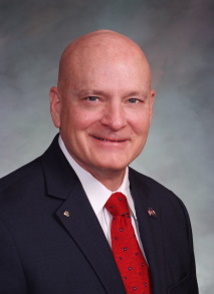Faced with a statewide mental health and suicide crisis, the Wyoming Legislature fell largely flat in its efforts to confront the problem during its 2023 session.
Lawmakers voted down three proposals that would have increased mental healthcare and suicide prevention in Wyoming: Medicaid expansion, funding the statewide 988 suicide hotline, and a pilot program for better mental health treatment in schools.
They did approve two lesser measures: a bill that will allow Wyoming residents to receive mental healthcare via providers in other states, and an extension of Medicaid coverage for uninsured new moms, which will help treat postpartum depression.
But lawmakers balked at broader fixes, despite the huge windfall of revenue at their disposal thanks to a banner year for the oil and gas industry and money already sitting in the state’s “Rainy Day Fund” from federal emergency pandemic relief.

The Legislature socked $1.4 billion into savings in 2023—an all-time record—although it did restore the $15 million it cut from mental health services in 2021.
Rep. John Bear (R-Gillette), chairman of the Legislature’s so-called “Freedom Caucus,” complained that the government has grown “too expansive” and pointed to the Department of Health as the main culprit. This was his rationale for the Freedom Caucus opposing every single measure this year to increase mental health services, and healthcare services in general.
Some lawmakers expressed frustration after the session at the lack of action on mental health. At a summit hosted by Governor Mark Gordon earlier this month in Casper, Speaker of the House Albert Sommers (R-Pinedale) bluntly diagnosed the Legislature’s problem:
“What doesn’t work is not trying,” Sommers said. “I know darn well that doesn’t work.”
Cut the line
The Legislature refused a to create a permanent funding source for the state’s new 988 suicide prevention hotline, creating dire uncertainty for the program’s future—it was created during a boom, but it’s precisely the type of program Wyoming lawmakers tend to eliminate during a bust.
Wyoming’s suicide rate fell for the first time in four years in 2022. Mental health professionals attribute at least a portion of this success to the 988 line.
Governor Gordon had strong words at his summit for the so-called “Freedom Caucus” over its opposition to funding the state’s 988 call center and other mental health solutions.
“When somebody tells you phone calls don’t make a difference, tell them they’re full of beans,” Gordon said. “The highest volume of calls we have seen has been in the last year, and we’ve also seen a lot of interventions that have worked.”
In a nod to the Freedom Caucus, which claims that religious and philanthropic groups should solve our major social problems, the governor said anyone who believes a non-government approach can solve Wyoming’s mental health crisis needs to start writing checks.
20,000 remain without health coverage
For all his bluster on behalf of the suicide hotline, Governor Gordon was no help this year in supporting the policy that would have provided the biggest boost to Wyoming mental health treatment: Medicaid expansion.
“For many low-income Wyomingites who don’t have health insurance, help is out of reach.”
Gordon has publicly opposed Medicaid expansion despite its obvious potential benefits to the state’s mental health.
Roughly 20,000 people in Wyoming have no reasonable access to affordable mental healthcare because they lack insurance. Mental health organizations widely support Medicaid expansion for this reason.
“When people receive help and treatment for mental health, their outcomes improve significantly. But for many low-income Wyomingites who don’t have health insurance, help is out of reach,” Wyoming Psychological Association Legislative Chair Hollis Hackman said.
Hackman and many others have pointed to the dramatic increase in mental health care in Montana after the state expanded its own Medicaid program in 2016.
The Legislature’s Joint Revenue Committee sponsored a bill that would close Wyoming’s “coverage gap” by expanding the state’s Medicaid program.
The bill passed out of a House committee, but Freedom Caucus member Rep. Chip Neiman (R-Hulett), serving as the House Majority Floor Leader, refused to allow it to proceed to the floor before a procedural deadline, killing it single-handedly.
No help for schools
Concern over youth mental health in Wyoming has intensified in recent years, particularly after the COVID-19 pandemic.
Wyoming’s adolescent suicide rate has been steadily rising for a decade and is constantly higher than the national average.

Even as federal funding for pandemic relief has helped support positive programs, Wyoming school districts are nevertheless still patching together services to provide mental health treatment for students. Many smaller districts have no mental health professionals on staff.
In response, the Legislature’s Joint Education Committee sponsored a bill to provide school districts funding to hire dedicated mental health professionals. The Wyoming Department of Education and the Wyoming Education Association, among others, strongly supported the bill.
“For too many students, schools are their main, or only, source of mental healthcare,” WEA President Grady Hutcherson told lawmakers during testimony. “Kids can’t learn if they are contemplating suicide. Schools play an invaluable role in ensuring students’ most basic needs are met so that they are able to focus on learning.”
But Freedom Caucus members on the Senate Education Committee—Sens. Bo Biteman (R-Ranchester), Cheri Steinmetz (R-Lingle), and Evie Brennan (R-Cheyenne)—killed the proposal with a 2 – 3 vote.
Biteman said that he just didn’t want to create another government program to fund.

